Mladen and Del review ‘Sputnik’

Image courtesy of Sony Pictures.
“Sputnik” Starring Oksana Akinshina, Fyodor Bondarchuk, Pyotr Fyodorov, Anton Vasiliev and others. Directed by Egor Abramenko. Music by Oleg Karpachev. 113 minutes. Amazon Prime. Should be rated R for at least gore.
Mladen’s take
If the commie pinko fascist reds of the Putin regime savaging Russia today ever build an economy and arsenal like a few of that luckless nation’s citizens built the film “Sputnik,” the U.S. is in trouble. “Sputnik” is Grade A sci-fi horror nicely balanced with the correct doses of well acted storytelling, a world class score, and sophisticated, non-overbearing CGI. The movie is in Russian, so it’s captioned. Inevitably, something must’ve been lost in translation to English, but don’t let that discourage you from seeing the film. The captioning is good enough to convey its neat ideas and the character of the characters.
The Soviet Union is only seven years from disintegrating when this movie takes place. It’s 1983. It’s still the first Cold War. And, the Politburo needs a nationalistic win to boost the country’s sagging morale. The U.S.S.R. war in Afghanistan ain’t going well. Consumer goods are in short supply, unless you’re privileged. The Communist Party is going through leaders like Donald Moron Trump goes through unqualified cabinet secretaries. So, the addled Soviet Union turns to one of its few semi successes, space travel, for a taste of accomplishment. Two of its cosmonauts go into low-earth orbit, but three passengers return.
What unfolds next will have movie reviewers inevitably drawing comparisons between “Sputnik” and one of the two greatest sci-fi horror films ever, “Alien.” Labeling “Sputnik” an “Alien” derivative would be a false equivalency, however. It’d be like bashing “Alien” for mimicking “Invasion of the Body Snatchers.” There’s nothing new in moviedom about films creature featuring critters living inside us. “Invasion” with Donald Sutherland is a terrific movie, as is “Alien” with Sigourney Weaver. In “Sputnik,” Oksana Akinshina is top notch as her character, neuropsychiatrist Tatyana Klimova. Amiably menacing Fyodor Bondarchuk as Colonel Semiradov, charming survivor cosmonaut Konstantin Veshnyakov played by Pyotr Fyodorov, and Anton Vasiliev donning the role of ambitious but riven Dr. Yan Rigel are excellent, too. Even the movie’s title is well executed. “Sputnik” means “fellow traveler” or “companion,” but, generally, in a friendly way. That’s not what we get here.
“Sputnik” is one of the finest sci-fi movies I’ve seen in years. It’s better than “Life,” “Annihilation,” “High Life” or “Ad Astra.” It approaches “Europa Report” and “Arrival” in quality in terms of applying science to decipher what’s occurring, as well as acting and atmosphere. As with “Arrival,” for example, there’s a strong and intelligent female as the principal player in “Sputnik.” There’s tension and a twist or two as the characters develop. There’s realism. In “Arrival” the militaries of the world take the lead in trying to understand the aliens that have parked ships above certain spots on Earth. In “Sputnik,” the Soviet army’s Semiradov is trying to weaponize the trilling, cute-ish, slimy symbiont emerging nightly from the esophagus of Veshnyakov to feed. Pay attention to that part, the feeding. The food the alien needs is produced by a human’s endocrine subsystem. The way the creature ensures that happens is one of the movie’s provocative and original ideas. Loved it.
Come to think of it, there’s one other parallel between “Arrival” and “Sputnik.” This one falls into the category of irritating with a caveat. Both films have annoying time spanning flashes that involve children. Where that was needed to tell the story in “Arrival,” it was not needed to tell the story in “Sputnik.” But, that’s a minor quibble.
Disregard Del’s take, if he even suggests in his introduction that the film stinks. To dislike “Sputnik” is to demonstrate short-circuited sensory response, poor reasoning, a flawed recollection of movie history, moral turpitude and full-on soullessness. Watch “Sputnik.” It’s so good that I’m hoping to buy the film on Blu-ray. This way, when some National Security Agency trained, white hat hacker blows up the internet in anger after losing his Luke Skywalker figurine still in the original package that he put up as collateral to speculate on cryptocurrency futures, I’ll be able to watch this film again and again without worrying about access to a streaming service.
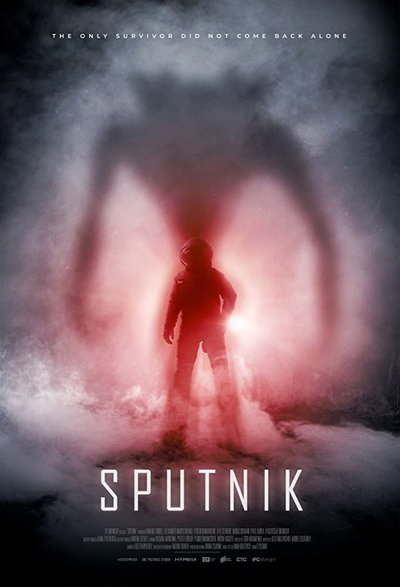
Del’s take
Man, what a stinker!
(I am picturing Mladen frothing at the mouth, his eyes goggling out like one of those squishy rubber chickens.)
On second thought, mark your calendars, folks, because today is one of those rare occasions – snow falling on Labor Day, the Florida unemployment compensation site actually working – when Mladen and I agree on something. “Sputnik” is a splendid film, the kind once made in America before the MBAs took over Hollywood.
“Sputnik” is a period piece, set in that happy time frame – for the United States, anyway – of the 1980s when MTV played music videos, imported beer became all the rage and many of us had waistline measurements that did not begin with the number 4. Except in “Sputnik” we are mired in the drab, run-down Soviet Union where people seem drab and run-down themselves, perhaps wearied by the relentless and dispiriting reality of communism. Neuropsychiatrist Tatyana Klimova, who has lost her job because of her unorthodox methods, has been summoned to a remote military facility to examine one of two recently returned cosmonauts – the other is deceased – who is experiencing amnesia. Except there’s a complication and I like the way Mladen put it: “Two of its cosmonauts go into low-earth orbit, but three passengers return.”
That’s a creepy premise and the movie delivers on creep, offering start-to-finish tension that lets up only briefly to set the stage of an original and surprising finish, one I’m surprised Mladen didn’t crab about seeing as how it’s laden with sentimentality.
Mladen is right. “Sputnik” has drawn comparisons to “Alien,” but the world of fiction, be it print or moving picture, provides a surfeit of tales about small groups confined to small spaces facing a singular threat – the Agatha Christie novel “And Then There Were None,” the lighthouse couple in “Day of the Triffids,” and even the happy gang of “The Walking Dead” to name a few. “Sputnik” may tread familiar ground but it strikes its own path.
It is no coincidence a movie about a man afflicted with a destructive internal force and the woman determined to save him takes place in a creaky totalitarian regime that is rotting from the inside, and Americans should pay heed to the cautionary aspects of the movie, which equally reflect the intellectual and moral rot eating the heart out of this country. That comment may not sit well with the Sieg Heil crowd that seems to be running Washington these days, but you know what? They’ll get over it.
The Russians and Chinese are improving their movie-making skills – “Winter of the Dead” and “The Wandering Earth” are two examples – and “Sputnik” continues that trend. I don’t draw any political conclusions from this fact – I think the improvements have come in spite of their no-fun, no-inspiration political and economic systems. Like Klimova of “Sputnik,” some moviemakers in those repressed states have risen above their hopeless surroundings to find some measure of success. Let’s hope that trend is just the beginning.
I give “Sputnik” an A.
There, Comrade Mladen. Are you happy now?
Mladen Rudman is a former journalist and technical writer. Del Stone Jr. is a former journalist and author.
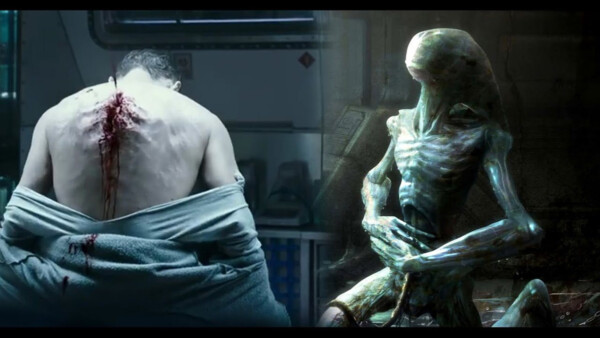
Image courtesy of 20th Century Fox.
“Alien: Covenant” Starring Michael Fassbender, Katherine Waterston, Billy Crudup, Danny McBridge, Demian Bichir. Directed by Ridley Scott. 122 minutes. Rated R.
Del’s take
“Alien: Covenant” is probably the movie you wish “Prometheus” had been.
It has a lot going for it: Storytelling is slick and efficient, eschewing junked-up plots and mystical mumbo-jumbo. Characterization is improved, with believable people speaking believable lines. And it does a creditable job of untangling the execrable birds’ nest of plotlines and unanswered questions presented by the afore-mentioned predecessor.
Director Ridley Scott sticks with the familiar and tries to evoke the grime and claustrophobia of “Alien,” while at the same time throwing in the rough-hewn desperation of “Aliens.” That’s where “Covenant” goes awry. In parts it is not so much an homage to the first two and best entries in the “Alien” canon but a blatant ripoff worthy of a J.J. Abrams flick.
Still, it’s not a bad movie and it puts the “Alien” franchise back on course with the possibility of future interesting sequels. For those all these reasons you should see it.
The movie stars Michael Fassbender as David or, schizophrenically, Walter, the yin and the yang of the story’s synthetic characters. Walter is a newer, more hepped up version of David who, unfortunately or fortunately, depending on your point of view, has been stripped of his ability to “create.” That ability also prevents him from slaughtering human beings; feel free to decide if that’s a good or bad thing. I personally feel it’s bad, but hey – no judgments here.
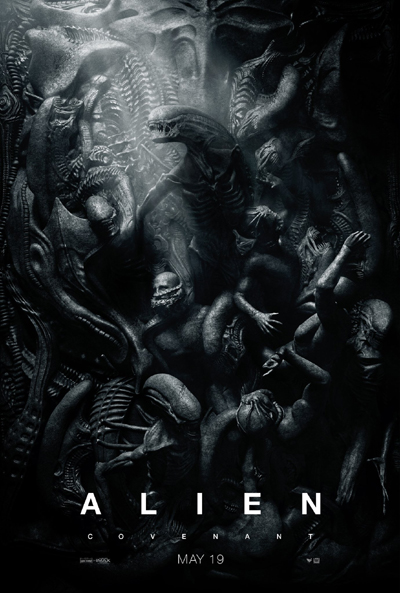
Walter is on board a colony ship headed for a distant planet when suddenly a neutrino storm strikes and the ship is disabled. The crewmembers are awakened from their hibernation pods to deal with the crisis and discover a closer planet more conducive to life. They are made aware of its existence by an incoming signal.
Hmmm. Where have we seen THAT before?
Upon awakening Katherine Waterston, who plays Daniels, almost immediately becomes the victim of a tragedy, one that ultimately brings the entire ship, crew and passengers into the jaws of peril. The tragedy potential is compounded when the decision is made to check out this signal, and this great new party spot on this interstellar pub crawl.
They land on a stormy planet to find a shattered city and the mummified corpses of thousands of its residents, the tall beings from “Prometheus.” Oh, and there’s another weird wreck of a U-shaped spaceship and finally David, who has lived here over the 10 years since the Prometheus disappeared.
They say idle hands are the devil’s playthings, and David has been very, very idle, or should we say very, very busy. Busy with what I won’t say, because that represents an answer to a critical question and it sets up the premise of the sequel. Suffice it to say Walter’s creators had good reason to leave out his creativity chip.
Apart from an opening soliloquy which could have been omitted without any loss to the film, “Covenant” moves along at a brisk pace, alternating between explanation and action. It does not feel like a two-hour movie. Scott, when he isn’t hobbled by a crappy screenplay, can still direct a lean and mean fighting machine of a film.
Fassbender is again superb as David and Walter, slipping back and forth between a polished Oxford and Midwest twang of accents with ease. Waterston is a kind of Signourney Weaver lite trying to fill the Ripley bandolier, but she doesn’t quite carry it off. Billy Crudup makes for a good sniveling Oram, the indecisive, overly religious mission commander who wants the crew to both love and respect him and succeeds at neither, The others are functionally cannon fodder who do rise above their meager contributions, so overall the acting component is effective.
The problem with “Covenant” is that it harkens back too often and too distinctly to “Alien” and “Aliens.” Let me count some of the ways:
1. The crew is summoned to an alien moon by a signal of unknown origin – check.
2. Crawling through dark passageways lit by strobes and punctuated by screaming alarms – check.
3. A rough ride to the surface in a drop ship led by a cowardly commander – check.
4. A tough female lead telling her fellow survivors, “We will seal off the accessways hatch by hatch and blow this motherfucker into outer space” – check.
5. The same tough female lead doing battle with the monster using a large piece of equipment – check.
Even the soundtrack borrows heavily from “Alien,” “Aliens” and “Prometheus.”
There were moments when I thought I was watching Ripley do battle with her extraterrestrial antagonist – THAT’s how similar the tone, pacing and more subtle ingredients, like color palette, were to those earlier movies.
That’s a problem for “Covenant” because those elements don’t mix well. “Alien” and “Aliens,” while sharing a similar premise, are two dramatically different movies, each with its own formulary for pacing and tension. You can’t blend the two and come away with a terrific cinematic experience no more than you can blend a pizza with a cheesecake and come away with a terrific gastronomic experience.
“Covenant” achieves a kind of limited success by answering questions and propelling the series into the realm of sequels, but its reliance on what has come before renders it into a derivative mashup that handicaps its ranking in the “Alien” pantheon. Of all the movies I would rate “Alien” the best with “Aliens” running a very close second. “Alien 3” was essentially a music video that nonetheless had an interesting look and feel, although it squandered all the grandeur of its predecessors. The Winona Ryder “Alien” was insipid and banal, and “Prometheus” was an unmitigated disaster.
Therefore I would place “Covenant” at a distant third on the list, and give it a generous grade of B.
Del Stone Jr. is a former journalist and author.
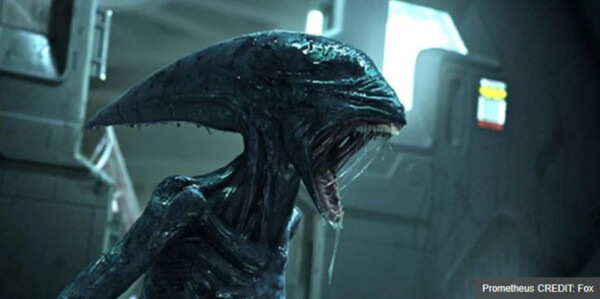
Image courtesy of 20th Century Studios.
—
“Prometheus” Starring Noomi Rapace, Michael Fassbender, Logan Marshall-Green, Charlize Theron. Directed by Ridley Scott. 124 minutes. Rated R.
Del’s take
Going into “Prometheus” I warned myself against indulging expectations; I had, after all, been savoring this moment since learning “Alien” director Ridley Scott was returning to the creepy, Gigeresque universe he so famously created in 1979.
Coming out of “Prometheus” I again warned myself against expectations: The movie was probably not as disappointing as my gut reaction would have me believe.
After much reflection, I can’t help but feel “Prometheus” is so much less than it could have been. Visually, the film is gorgeous. But the script is a muddle, the score incompatible with the movie’s tone, and some of the casting decisions simply don’t work.
The plot is straightforward. A pair of archeologists (Noomi Rapace as Elizabeth Shaw and Logan Marshall-Green as Charlie Holloway) discover a kind of star map in the glyphs of ancient terrestrial civilizations separated by time and distance. A corporation builds a starship, the Prometheus, to visit the location denoted by the map, so that the company’s founder can discover the secret to life … and perhaps extend his own. Once there they find mankind’s progenitors were not as paternalistic as they expected. All manner of wriggling, predatory horrors put human beings at the bottom of the food chain as they plan a planet-wide buffet.
The film’s exteriors are lush, sweeping and grandiose, but the interiors convey nothing of the shuddery claustrophobia evoked by “Alien.” The technology seems far advanced from “Alien,” which takes place after “Prometheus.” I don’t have a problem with that: The Nostromo was a tired old factory ship with outdated technology; “Prometheus” is a brand-new ship of exploration, likely equipped with the latest gadgets and gewgaws, despite its 30-year handicap.
Michael Fassbender delivers an Oscar-worthy performance as the amoral android David, and Charlize Theron is icily cool as the daughter of the Weyland Corporation’s founder. Less impressive are Sean Harris as the expedition’s geologist, and Rafe Spall as the team’s biologist. Neither display the kind of intellectual curiosity peculiar to scientists. Worse are Noomi Rapace and Logan Marshall-Green, who are completely unconvincing in their roles as the expedition’s ostensible scientific leadership. Ridley Scott has a love of strong female characters, but in “Prometheus” Rapace seems lost and dependent, besotted with a perpetual starry-eyed, doll-baby affect that seems incongruent with that of a true Scott survivor type. And let’s not talk about the film’s science, or the scientific method. “Prometheus” abandons even the most cursory protocols any scientist worth his salt would follow.
But that’s partially the fault of the script, which at times tries to take “Prometheus” into the realm of “2001,” while mostly devolving to “Starship Troopers” or even “Lost.” Blame that on co-writer Damon Lindelof, an alum of “Lost,” who seems stricken by the idea coy logic flaws represent depth. A true brain tease provokes curiosity, not irritation. Gone is the stark, narrowly focused conflicts of “Alien,” “Blade Runner” or “Thelma and Louise.” In its place is a taco-pizza-cheeseburger of a story that satisfies nobody.
“Prometheus” may have strands of “Alien” in its DNA, as Scott hinted during the movie’s production, but it’s a recessive gene. You see little of the “Alien” genius and lots of what I would call “current” storytelling, which seems less satisfied with delivering a credible tale than setting up a sequel.
In space, nobody can hear you scream. But in movie theaters they can hear you crying foul, and that’s what I heard.
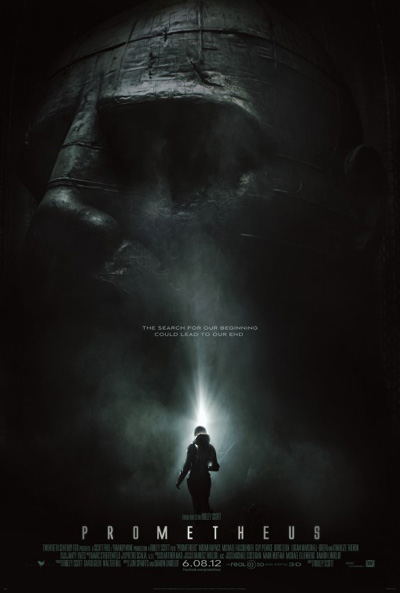
Mladen’s take
When I need Del to be merciless, he delivers a review that searched for a bright side to a dim movie. Del, can you hear me screaming in Fort Walton Beach, though we’re a couple of miles apart?
It was good “Prometheus” didn’t come with a money-back guarantee for the audience because the production companies that financed this unfathomable film would go broke. My review is short because I stopped paying attention to the movie about halfway through it’s all too long runtime.
“Prometheus” was billed as the prequel to “Alien,” one of the finest movies of all time, and that was a severe error. Though directed by the same man, Ridley Scott, “Prometheus” and “Alien” are worlds apart.
“Alien” is a sci-fi horror movie, pure and simple and completely engrossing. “Prometheus” is just gross, while suffering from an identity crisis. Is it sci-fi horror like “Alien” or sci-fi action like “Aliens”? In fact, it’s more like “Hostel” meets “Event Horizon” meets “The Human Centipede.”
Almost from the beginning, the movie starts to meander toward the unexplained.
There are 17 people aboard spaceship Prometheus, which is about 10 too many. Only a handful of the 17 characters are developed and all of them are, at best, mildly interesting or, at worst, unlikable.
There are metallic vases oozing black liquid, an aggressive slug breaking an arm and then swimming down the victim’s throat, and an absolutely foul scene were one of the protagonists endures a vividly portrayed Cesarean section inside a healing chamber and then fights the creature just pulled from her abdomen.
None of the scientists behaved like scientists, including the decision to reanimate in the open the head of a hominid-like being because it looked like something abnormal was growing from it when its owner died.
In “Prometheus,” events just happened that seemed unconnected or arbitrary. The story lacked cohesion. It failed to explain the reason our creators were so unflinchingly hostile to us, their children, so to speak.
“Prometheus” could have explored the questions it awkwardly raised. Is there God? Can science and religion co-exist? Is mankind a controlled experiment with Earth the incubator? Instead, we get a mish-mash of themes and banal dialogue.
There are no Oscar contenders in this movie. Not for script. Not for acting. Not for score. Hell, not even for visual effects. The movie was disappointing.
Mladen Rudman is a former journalist and technical editor. Del Stone Jr. is a former journalist and author.